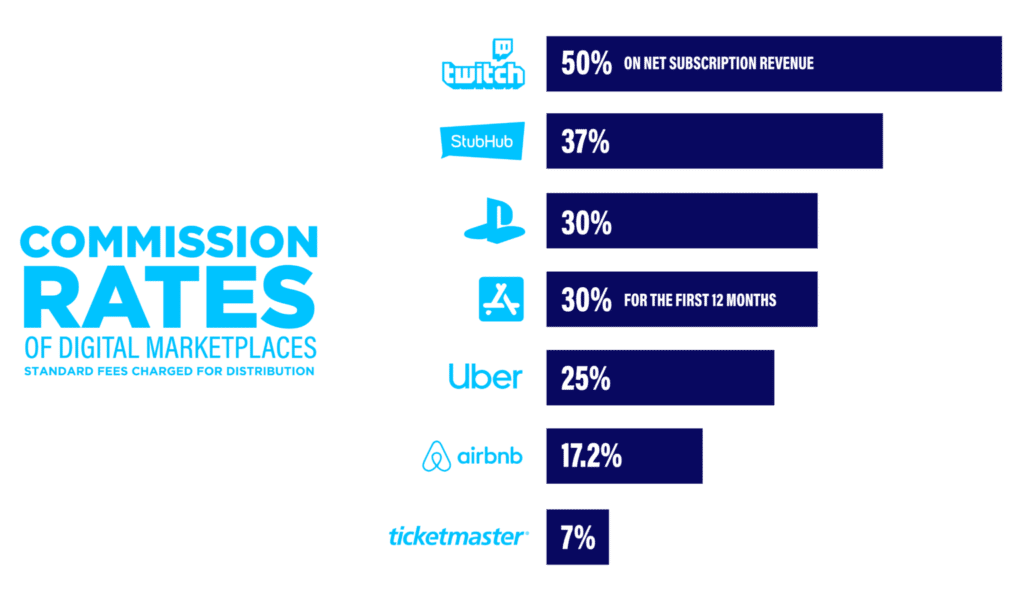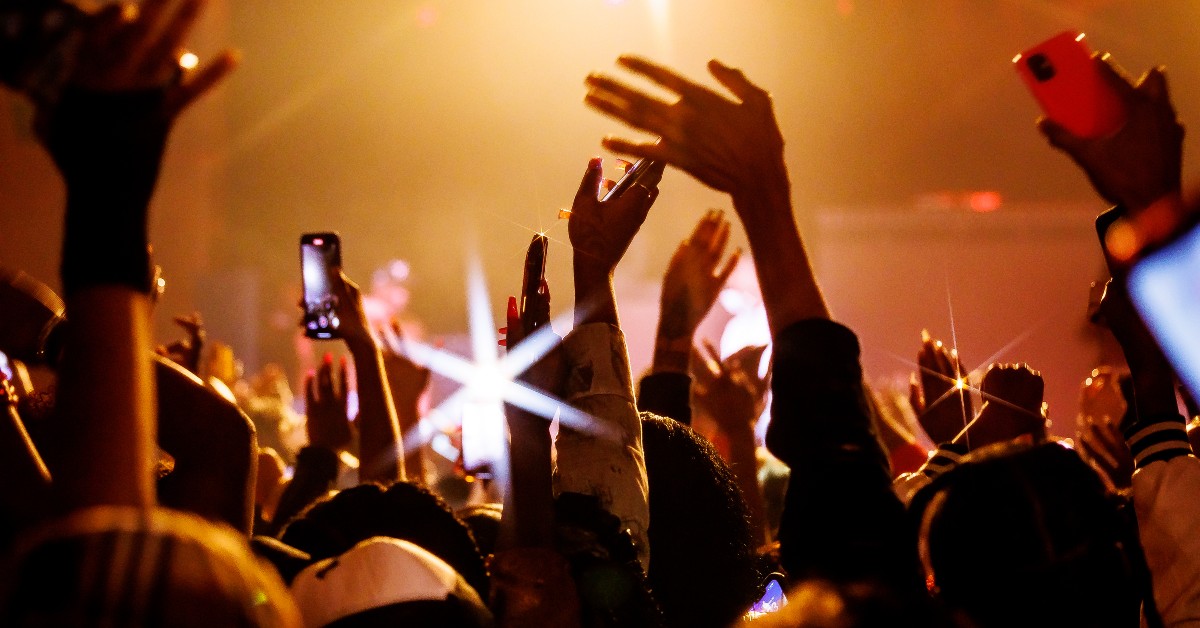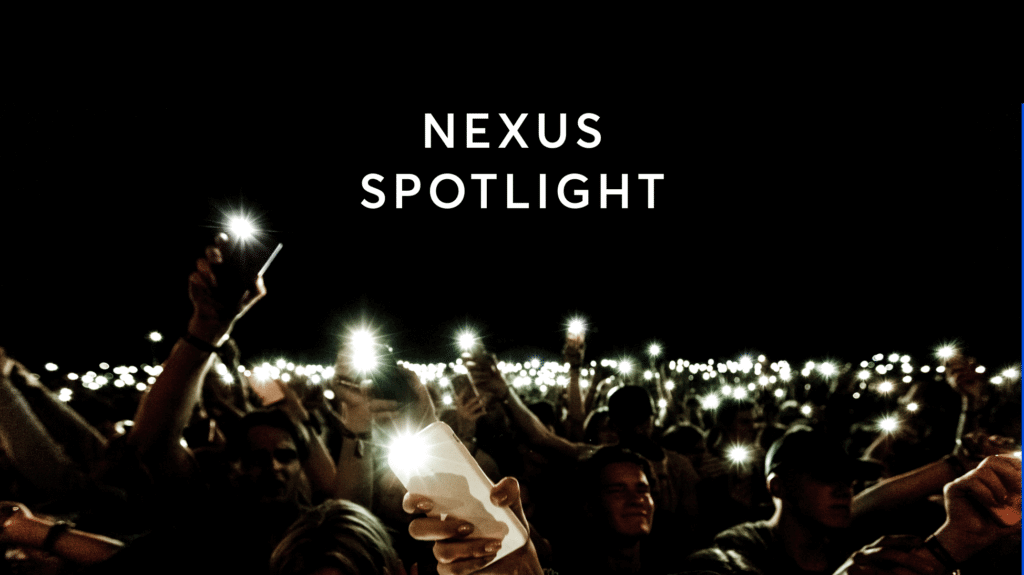By Dan Wall
In the ongoing antitrust attacks on Live Nation and Ticketmaster, a constant theme is that their alleged “monopolies” are responsible for high ticket prices. Rhetorically, that’s understandable, because if you want to rile up fans against Live Nation and Ticketmaster, there is no better way than to blame them for something you know fans dislike. But is there really a connection between any of these antitrust arguments and prices for concert tickets? That’s the subject of today’s post.
The starting point is what Live Nation and Ticketmaster actually do. What roles do they play in the concert industry and what power does that give them to influence ticket prices? We’ll start with Ticketmaster, since it tends to get the lion’s share of the blame for high ticket prices even though, as we shall see, it has the least influence over prices.
How Ticketing Works
Ticketmaster and other “primary ticketing companies” provide the technology and services that venues need to manage and market shows, sell tickets, and validate tickets for entry. Typically, one primary ticketing company provides these services for all events at a given venue. The chosen ticketing company then interfaces with consumers on online marketplaces, not to sell inventory of their own, but as agents of the venues selling tickets priced by performers and production entities. Fans tend not to understand that. They think of Ticketmaster as an enormous ticket retailer that acquires vast quantities of tickets and puts them up for sale at prices Ticketmaster determines – an assumption that makes it easy to blame Ticketmaster for high ticket prices. But that’s not true.
Tickets are actually priced by artists and teams. It’s their show, they get to decide what it costs to get in. The NBA tickets on Ticketmaster were priced by the home teams, concert tickets were priced by the performer’s business teams, Monster Jam tickets were priced by its producer (Feld Entertainment), and so forth.
The Truth About Fees
The argument that Ticketmaster is responsible for high prices is really about service charges. The practice in Canada for decades was to break down the cost of admission into a “face value” sum and one or more fees added to face value.
However, we believe fans are served best when met with transparency. On Ticketmaster.ca fans always see the all-in cost at every stage of the ticket purchasing process. We support and comply with “all-in pricing” which is mandatory in the majority of Canadian provinces. This means fans see the full price, including both the all-in price and the fee breakdown of the ticket upfront.
Service charges are added to the face value of concert tickets because two important players in the concert ecosystem – venues and primary ticketing companies – get little or nothing out of the revenues derived from the ticket’s face value. That money goes mostly to the performers, secondarily to cover certain show costs, and if anything is left over to the promoters. So, the practice developed to add a percentage service charge to a ticket’s face value to pay the venue for hosting the event and the primary ticketing company for servicing venues and distributing tickets. The add-on nature of the service fee is annoying to many fans and fuels the narrative that these are junk fees. But they are not junk fees for the simple reason that the venues and ticketing companies have costs associated with the services they provide to help produce the show. They provide value and one way or another will be compensated for it.
Fans are also told that service charges are Ticketmaster’s way of raising ticket prices. In fact, Ticketmaster does not set service charges, venues do, and most of the money goes to the venues. Let’s break that down.
Primary ticketing service charges are a product of the hundreds of contracts that exist between venues and their exclusive ticketing providers. They are not uniform, but a typical contract will provide that in exchange for its services and some guaranteed cash payments to the venue, the ticketing company will get a stated percentage of the service charge the venue intends to impose, a dollar-per-ticket fee, or some combination of the two. The venue decides on the service fees. During the ticketing contract bidding process, the venue tells the bidding ticketing companies that it intends to charge certain fees, and the ticketing companies structure their offers accordingly.
However the contract turns out, the venue gets most of the service fee, not Ticketmaster or any other primary ticketing company. In fact, the venue normally gets around two-thirds of the service charge and in many cases a facility fee as well. So, if fees add, say, 30% to the face value of a ticket, the primary ticketing company is getting perhaps a quarter of that – something in the range of 5-7%. And the primary ticketing company is not making 5-7% per ticket as profit because it has costs to cover, not the least of which are the guaranteed payments to the venue it needed to promise to win the contract. A primary ticketing company’s profit per ticket is closer to 2% of the average ticket price, a figure far too low to be the cause of high ticket prices.
But let’s ignore costs and just ask whether getting a 5-7% commission on the sale of a concert ticket is abnormal or unreasonable. In today’s economy we have a lot of data points about what digital distribution usually costs. We can, for example, compare Ticketmaster’s 5-7% commission rate with what other digital distribution platforms charge. The fact is that the 5-7% fee that primary ticketing companies earn on ticket sales is extremely low by the standards of digital distribution. Here’s how it stacks up against a collection of other fees charged by online marketplaces.

If distribution makes up 25%, 37% or 50% of what a consumer pays for something, of course it bears some responsibility for the ultimate price. But at just 5-7%, there is no rational basis for thinking that primary ticketing companies are the cause of high concert ticket prices. They charge too little, and even if one were to assume — without any evidence — that there is some amount of unjustified “monopoly profit” in a 5-7% commission, it could not affect ticket prices by more than one or two percent at worst. So the narrative that Ticketmaster fees are responsible for high ticket prices makes no sense. There is no way that’s true.
The Role of the Promoter
Now let’s consider Live Nation in its role as a concert promoter. The arguments we hear about Live Nation’s role in concert pricing are inconsistent. Some claim that Live Nation is so powerful in concert promotion that it can dictate what artists charge; others claim that Live Nation can raise its prices to artists, and this gets passed through to fans in higher ticket prices. Neither argument is plausible.
Concert promoters provide an array of services related to putting on memorable and financially successful concerts. They help the performers secure the right venues, negotiate deals with venues and others, advise on pricing, market the shows, and manage the countless details involved in hosting a concert. But promoters don’t get paid for their services directly, the way a lawyer or an accountant might. Concert promoters invest in the show or tour by guaranteeing the performers a certain amount of money on the hope and expectation that there will be some profit for the promoter after the performers have been paid and all show costs have been covered. Promoters, in other words, are risk takers: they bankroll the show hoping it turns out to be profitable, but the risks they take make their compensation uncertain.
Promoters do not set ticket prices. They care deeply about pricing, and are usually quite sophisticated about it, because the offers they make to artists necessarily anticipate and depend on the number of, and prices for, tickets likely to be sold. Think about a simple guarantee to an artist of $100,000 for one show at a 5,000 seat venue: there is no way for a responsible promoter to offer that guarantee without at least a general understanding of what those 5,000 tickets will sell for. This is the same reason why the investors on Shark Tank ask potential partners how much they charge for their products. If your money is at risk, you pay attention to pricing.
Nevertheless, promoters don’t set prices, artists do. The artist and her business team listen to the promoter’s input and then decide. This is the case even with a promoter as large as Live Nation or AEG. Furthermore, if you want to talk about a promoter’s pricing incentives, the last thing a concert promoter wants to do is charge too much for a show. That is a surefire way for the promoter to lose money. The promoter’s incentive is to find the sweet spot that balances ticket revenues and the probability of a sellout. That’s what gives promoters a reasonable chance of making money on the show.
There is even less merit to the idea that the promoter’s take from a concert pushes up ticket prices. Concert promotion services are not remotely expensive enough, let alone profitable enough, to have that effect.
A promoter’s compensation is the product of numerous terms in its contract with an artist. The most important are the guarantee to the artist, the artist percentage of revenues after ticket sales exceed the guarantee, and the terms defining the expenses that the promoter is allowed to recover. The guarantee is a fixed amount paid by the promoter to the artist regardless of whether the promoter loses money. For example, a band might be guaranteed $100,000, in which case it will be paid $100,000 irrespective of whether the concert makes money. The band may even make more if the show is successful, however, because through the artist percentage the band will also be entitled to a substantial part of any net ticket revenues. Nowadays, it’s common for top artists to get 90% or more of the net ticket revenues. The promoter gets only what remains after the guarantee, other show costs, and the artist’s percentage have been paid out. That depends critically on how many tickets are sold, which is unknown until the night of the show. To further complicate things, every deal is different, and artists vary widely by their popularity and bargaining power. Promoter “prices” — whatever one chooses that to mean — vary from deal to deal.
What we can say is that concert promotion is not a highly profitable business, even for Live Nation. In its annual reports, Live Nation reports billions of dollars of revenue for its Concerts segment because the acts it promotes sell billions of dollars in tickets. But Live Nation’s own income as a concert promoter is less than 2% of concert revenues. The Concerts segment’s adjusted operating income margin in 2023 was 1.7%.
On that basis alone it is obvious that what Live Nation earns as a concert promoter can’t be responsible for high ticket prices. It is not taking nearly enough of the ticket revenue to force up ticket prices meaningfully. And despite all the talk that Live Nation is becoming more and more powerful, the secular trend in the industry is that artists are getting an increasingly large share of ticket revenues. Concert promotion is an attractive business today largely because of its relationship to selling corporate sponsorships — an advertising business in which money comes neither from artists nor fans, but rather from big corporations.
We are left, then, with a ticketing distribution “monopoly” that charges a fraction of what most digital platforms charge and a concert promotions “monopoly” with a 1.7% AOI margin. And neither sets ticket prices.
What Really Causes High Ticket Prices
The real explanations for high ticket prices are well-understood and have very little to do with Live Nation or Ticketmaster. They begin with the economic conditions that explain most pricing: supply and demand. For a small percentage of concerts — the high-profile ones — consumer demand greatly exceeds the supply of available tickets. This is obvious at the apex of the industry, where stars like Taylor Swift, Beyoncé, Ed Sheeran, Bruce Springsteen and Harry Styles could easily sell out far more shows than they could realistically play. But it’s not just them. For the top 5-10% of touring artists, demand is regularly well in excess of the supply of tickets. We are fortunate that artists in this category choose not to exercise their full pricing power; otherwise, they would charge the much higher prices we see on resale markets. But basic economics applies to concert tickets too, so strong demand naturally leads to higher ticket pricing.
Closely related to this is the phenomenon of concerts becoming premier “experience goods.” Much has been written about the advent of the “experience economy,” in which economic value has shifted progressively from the production and supply of goods, to the delivery of services, and now to the staging of experiences. Music, whether recorded or live, is by its nature experienced, but plainly the live experience is richer and in economic terms more valuable. Concerts also have the potential to become spectacles, whether though elaborate staging and production or a consumer buzz that makes them “the place to be.” This factor is magnified by social media, which in addition to creating demand through ongoing connections to artists, allows concerts to be shared experiences when fans upload videos and “Instagrammable moments” to their social media platforms. The experience value of concerts has been increasing for decades, and with it the price of tickets.
Artists have also become more dependent on touring income over the last 25 years — the factor that Alan Krueger, who served as the Chairman of President Barack Obama’s Council of Economic Advisers, cited as “the primary reason why concert prices have risen so much since the late 1990s.” This is the direct result of a precipitous decline in the value of recorded music when streaming (and unauthorized duplication) led to drastically lower record sales, which in turn led record companies to withdraw from their traditional role bankrolling touring. In that environment, concerts could no longer be loss leaders to sell albums. They became the artist’s principal source of income, and priced accordingly.
How Resale Impacts Prices
Finally, the rise of today’s mammoth online resale markets has profoundly affected concert pricing. It has done so by undermining to a degree the longstanding practice of performers to substantially underprice tickets to their performances, especially the best seats to the hottest shows. Artists underprice tickets for several reasons, but mostly out of regard for their fans. There is a kind of social compact between performers and their devoted fans to charge them fair prices, not whatever the market will bear. StubHub and the resale marketplaces that followed it changed that forever by presenting artists with 24/7 reminders of what the true market value for their tickets is — and that when they don’t charge those prices scalpers will find ways to acquire tickets and resell them at full market value. That unquestionably affects what artists charge. They still don’t charge what the market will bear, not even for the best seats, but most charge more for the best seats than they would in the absence of all that scalping.
The common thread to all these factors is that they have nothing to do with who the promoter is or who sells tickets to the show. What Taylor Swift charges has nothing to do with whether she is promoted by Live Nation (which she is not) or Louis Messina of AEG (which she is). What Beyoncé charges has nothing to do with whether Ticketmaster or SeatGeek serves the venues she chooses to play. Either way, the performer’s business team will work with their chosen promoter and try to come up with the pricing strategy that strikes the right balance between the economic returns from the tour and doing right by their fans. The first part of that will turn mainly on data-driven judgments about demand. How did the performer’s last tour sell, and at what prices? What are comparable artists charging in similar venues in this tour cycle? How strong is demand for concerts generally at this time? Does the artist have recent hit songs — or a following that shows up every tour cycle regardless of recent hits? It may also be affected by venue considerations; for example, amphitheaters have lawn seating that traditionally commands low prices. The point, again, is that nothing turns on who the promoter or ticketing company is. Neither has the power to set prices, and the identity of the promoter or ticketing company is unrelated to the actual determinants of pricing.
Statements to the effect that Live Nation and Ticketmaster “keep ticket prices high” are just flat wrong. Anyone with a basic understanding of the industry knows this. Those who perpetuate this falsehood are cynical at best. They do a disservice to consumers and to rational political discourse.




